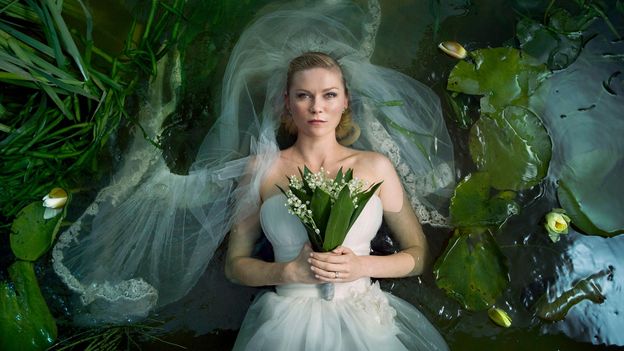What rings particularly true to him about Von Trier’s portrayal is the way in which he drops us into Justine’s depression with no exposition or backstory or attempt to make sense of her state of mind. “People always say to you, ‘But why are you feeling like this?’ I couldn’t put my finger on it. There wasn’t something like, you know, my parents had died. It settled on me like this cloud from out of nowhere. The film really understands that. She seems quite a privileged person. She’s got this incredible wedding, she’s marrying this gorgeous guy who’s for the most part is understanding and clearly loves her. She’s got a good job. She’s got all these things going on. But none of that matters. And when you have depression, nothing matters. Nothing touches it. You can’t make a dent in it.”
He was also deeply struck by the way in which Von Trier showed the physical side of depression – how it creates a heaviness that settles in the bones, making everything an effort. In Part Two, in another bath scene, Claire tries to coax a naked Justine to step over the porcelain rim into the water. But she can’t make it and just sags in Claire’s arms. “That really struck me,” says Graham, “because when it [the depression] was particularly bad, that’s exactly what it was like. And I’ve never seen that in another film. It’s so soul-sapping and overwhelming and all-consuming. It’s not just that you’re feeling down mentally or glum. It affects your whole body, so that you can barely move. Justine [has a line where she] says she feels she’s walking with grey wool attached to her and dragging her back. I used to get into work and if I had like, six emails to answer, it seemed an insurmountable mountain. It’s such a basic thing when you’re feeling fine; you fire off replies in one minute. But it felt like ‘six emails, I can’t cope with this, I just want to go home.'”
A lack of understanding
If the film is remarkable in depicting Justine’s mental turmoil, then it is equally strong in depicting the lack of understanding those with depression often must contend with – an attitude that is given a mouthpiece in the form of John, Justine’s brother-in-law. As he aggressively impresses upon her how much money has been spent on the wedding, his brute logic feels like psychological violence in the face of her helpless vulnerability. For Graham, such a cold attitude was mirrored in real life by some reactions to the film he encountered, coming out of the Cannes screening. “I can remember overhearing other journalists talking about it and they just didn’t get [the film] at all. [The attitude was] ‘Oh, get over yourself, snap out of it. You’ve got a lovely wedding put on, you obviously come from a nice family, what have you got to be miserable about?'”
In the final estimation, what is so remarkable about Melancholia’s portrayal of depression is not only the details but its entire worldview. It’s a film that, like many of Von Trier’s works, offers a provocation: the depressed outlook, it dares to suggest, is the correct one. The world is ending. Resistance is futile. All you can do is accept this state of catastrophe and relax into the beauty of this final spectacle.
